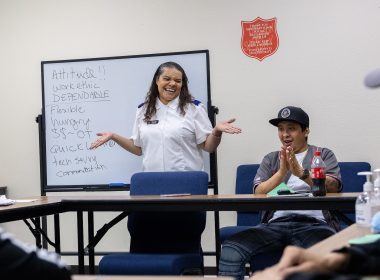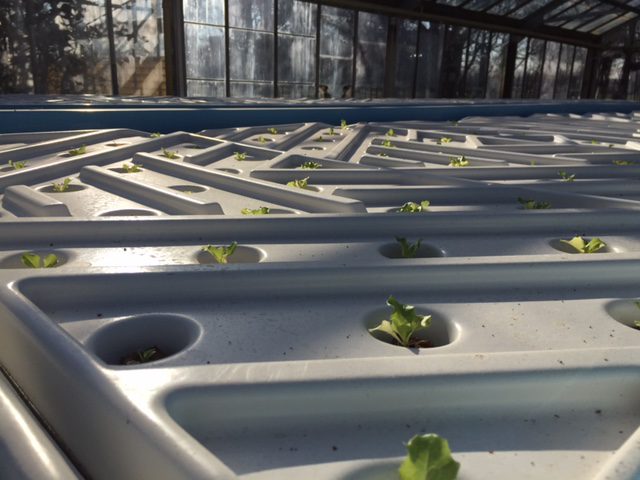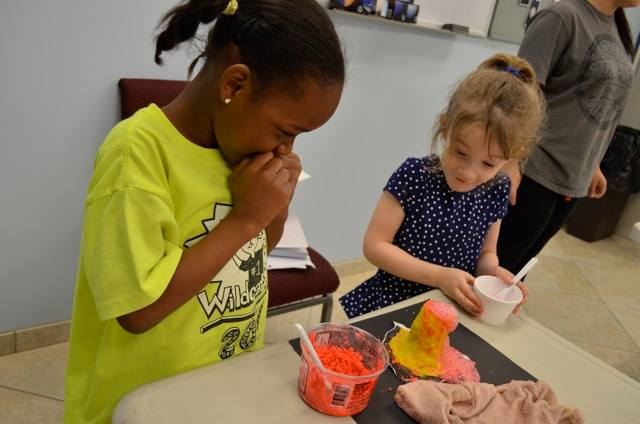Fresh kale, basil, lettuce and fish will make their way into corps’ meals and food pantry during the winter months.
By Jackeline Luna –

Dehydrated milk, canned fruits and vegetables, pasta, rice and boxed macaroni and cheese rank among the most donated items to food banks. Fresh leafy greens and fish donations come few and far between for The Salvation Army East Chicago Corps and Community Center, but the city’s newest project could change that.
The city of East Chicago, Ind., partnered with Glynn Barber, the inventor of an aquaponics system that can yield up to 500 pounds of fish a year and 300 lettuce heads a week at full capacity—in about a year’s time.
The project with Barber’s company, Environmentally Controlled Sustainable Integrated Agriculture, uses waste produced by farmed fish to supply nutrients to plants. The 500-gallon-tank aquaponic system has a growing area of 360 square feet and requires little electricity. Plant growth of up to two feet can be seen in about two weeks.
Once the produce is ready, it will be sold at a farmer’s market during the summer months and during the winter months, all produce will go to the East Chicago Corps, according to Mayor Anthony Copeland.
During his more than 23 years as a firefighter, Copeland remembers connecting with The Salvation Army’s Emergency Disaster Services team.
“I have a soft spot in my heart for The Salvation Army, because when we would go to fires or sometimes catastrophic things would happen, The Salvation Army would be there to pass out donuts or aid people who were just made homeless,” Copeland said. “And I saw that all those years, and then, when I became mayor, I saw the programs that they put together to feed the homeless.”
He said the organization fits the needs of the community perfectly. When it came down to selecting a beneficiary, he knew it had to be The Salvation Army.
The East Chicago Corps provides around 1,400 meals per month and fills about 275 grocery orders per month. Cadet Leta Marin is looking forward to including fresh vegetables and fish in meals and in grocery orders during the winter months, when the corps cannot operate its raised bed community garden.
“It will increase the quality of the meals we provide,” Marin said. “So instead of having it be more carbs-based, now we can add a salad in there. The same thing with our food pantry, instead of just having canned items and frozen items, having fresh items to give alongside of those can really help to fill out a meal and add some good nutrients.”
In January, the city unveiled the future sight of the newest aquaponics garden, a Parks and Recreations Department’s greenhouse that has gone largely unused. The mayor committed an initial $100,000 to the program, and indicated an additional $400,000 plus a potential matching grant if it is successful.
Copeland was first introduced to the zero waste aquaponics system while working on a comprehensive plan for the city.
“They introduced me to the inventor and he really just sold the product to me,” Copeland said. “When he just showed me the holistic approach it can take, I was sold.”
The greenhouse has since become a functioning aquaponics system. The tank grows yellow perch and largemouth bass and the red claw crayfish eat away the dead plant roots.
Barber has been working on developing the aquaponics system for almost a decade.
“We are very passionate about our technology because we grow a massive amount of food in a very small footprint in an extremely efficient manner,” Barber said. “Our systems run on very little power and they’re completely recirculating. We truly have a zero waste system.”
In the early stages of the project, only basil, kale, and lettuce will grow in the tank. Throughout the year, new plants will be introduced into the system and water from the troughs will be redirected to grow other rooting vegetables such as carrots, radishes and onions.











